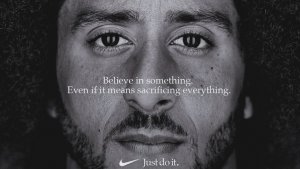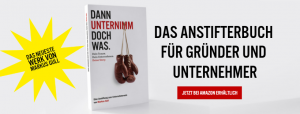The current Nike campaign offers all kinds of illustrative material on the subject of Erich Kästner, testimonials, brand story, purpose, authenticity and eggs - with special attention to the endangered steel-made variety, often also praised as cojones.

For the sake of academic experimentation, let's assume that Nike is serious about its social responsibilities and already behaves better in the production of its products than any other clean-cut company, i.e. does not exploit Asian seamstresses, does not put children to work, is squeamish about raw materials and so on. Let's assume that everything you read is simply not true, but that the Nikeinitiatives actually contribute to a better world, and that in terms of sustainability, no more trainers are shaken off the tree each year than grow back.
The claim Just do it has been Nike 's central brand message for 30 years and has long been part of common parlance. Just do it serves the sporting goods manufacturer and its fan community as a rallying cry for the struggle to believe in oneself, no matter what goals one is pursuing.
Whether you play football with your homies in a cage in the most dangerous district of the city and dream of a better life that will be fulfilled with a victory in the World Cup - start, believe in it, stick with it: just do it. Whether you finally want to conquer your inner bastard and start jogging - go a little faster for ten minutes but start, believe in it, stick with it: just do it.
We don't buy products, we buy what we want to be. And we all want to be part of something that is bigger than we are and thereby become a little bigger than we are. Or at least appear to be ...
With Nike, we buy above all the hope of more self-esteem. That is why Nike is in fact in the sporting goods business , but in fact it is in the enhancement business. In this specific case, Nike, the goddess of victory, conquers the strongest opponent of all success, who, as we all know, is entrenched in ourselves and is only waiting to stop us from taking the first step and to trip us up on the next one. But our incantation is: Just do it.
In this industry and with this message in communication, it is obvious that positive role models are made brand ambassadors and bearers of the campaigns - to increase attention and desirability, preferably celebrity testimonials.
Anyone who has ever worked with this methodology knows the avalanche of objections and questions that - as soon as the idea is voiced - immediately breaks through. The top ten read like this:
- A-listers cost so much money, is that why we sell more gym shorts?
- Shouldn't we use someone who is cheaper, even if he is not so well known?
- Is he/she sympathetic to all living beings on earth?
- Does he/she go down well with women?
- Does she/he go down well with men?
- Does he/she reach children, old people, young people?
- Real people are polarising - celebrities even more so, aren't they?
- What if she/he suddenly stops succeeding, or has an accident, or dies?
- What do we do when he/she tweets something stupid?
- And what do we do if he/she suddenly comes under suspicion of doping, causes a scandal, drinks, takes drugs, strangles an escort girl, is arrested at his/her neighbour's property - in other words, behaves like Jan Ullrich?
We will spare answers to the first seven questions here, however 8, 9 and 10 are circumstances to be concerned with because they can have an almost uncontrollable impact on the brand and its relationship with its audience.
How do you deal with problems as a company? That says a lot about the identity of a brand.
How is Mercedes behaving in the Mesut Özil story and what will be said & done at the end of the contract period?
How loyal is a brand when its brand ambassador sports star is out of the race because of an accident and may never come back? In 2001, Austrian Raiffeisen even produced its own film with Hermann Maier after his motorbike accident under the title "Stille Siege" (Silent Victories ), thus activating a core value of the brand: "Even if things go badly for you, we stick together and won't let you down."
And now Nike, with its sights set on the Just Do It anniversary, is showing off with a new campaign that extends the brand message from the idea of sporting performance into the socio-political discussion and focuses on diversity and equality.
Two years ago, San Francisco 49ers quarterback Colin Kaepernick sent a signal of protest against police brutality and racial inequality to the world with his kneeling and raised fists during the playing of the American anthem, and many other athletes followed his example.
It's nice that Erich Kästner was right: "Who dares to oppose the thundering trains? The little flowers between the railway sleepers." Sometimes small flowers look like giant football players.
Not everyone is a friend of flowers. Kaepernick now has no team, is in a clinch with the NFL and the quaterback of madness Donald Trump for once reacted as you would expect him to: like a thundering train loaded with massive abuse.
Nike is now marching forward. "Believe in something. Even if it means sacrificing everything," Kaepernick tweeted the phrase, which is featured on the latest print subjects. Nike North America brand vice president Gino Fisanotti said: "We believe Colin is one of the most inspirational athletes of his generation who used the platform of sport to make the world a better place."
Or, as Erich Kästner put it: "There is nothing good unless you do it ...".
One can rule out the possibility that Nike did not know what kind of backlash to expect. Because it's one thing for the majority in our part of the world to classify everything Trump & Co. trumpet as crazy. In the US, many see the world differently than we do, namely the way Trump does. And they burn Nike shoesthere - and not just for lack of books to hand.
And now it hurts: Nike's share price is falling.
Believe in something. Even if it means sacrificing everything. That takes courage. What something is worth to you is clearly shown in our society by what you are prepared to spend money on. Or to lose, even in the form of stock market value.
Courage usually requires bravery as a consequence. And consistency.
Otherwise another question will quickly arise: Are you really serious? Is this an authentic concern for you?
The touching film with Colin Kaepernick that follows the print subjects is excellently made with great mastery, even though we already know it from Apple (Think different) and Samsung (Do what you can't), among others. For all the moving emotionality and strength of the message Dream crazy, the film is still harmless in the end. Not a step forward, but one back into the rear guard.
Colin Kaepernick boldly takes a knee and stands up with it, risking not only money but what he loves, his sport. Nike as a brand has less courage than its brand ambassador. The defence runs up, the quarterback has a break.
Pity.
For Nike, ROI and ROE - i.e. return of involvement and return of engagement - could more than make up for all the losses if they started to delve a little deeper into the matter than just making statements, living up to their own mantra and thus sustainably expanding their fan base. For example, with the active launch of diversity and integration programmes, exactly where it hurts and is necessary, in one's own sphere of influence, for example, and then beyond. Just as we have done with Ben & Jerry's Always and Patagonia . - Just do it.
Socio-political engagement is a highly risky thing for brands. Especially when corporate stupidity is added to the mix, it can backfire so badly. We remember with a slight brainache the Pepsi X Kendall Jenner insert and similar failures.
Whoever gets involved in this, please answer the following questions in all silence and honesty:
- Is it a marketing spin or an authentic cause? Would I also stand up for it without it bringing advertising benefits to my brand?
- Does the Purpose contribute to the benefit of the audience and society?
- Does my campaign activate the audience?
If you answer "no" to even one of the questions, leave it alone.
If you can answer all three questions with "Yes!", then there is the not insignificant control question:
- What are my cojones made of?
Here, "Made of steel!" would be the right answer.
If so, here's some good news: you have a story!
The Brand Purpose is the mighty beating heart of an authentic brand. It definitely doesn't always have to be a social purpose, please, but authentic in any case. Otherwise you're just spreading the noise before the defeat.
Companies and their brands can develop enormous power in their communication, as we all know and know painfully in the daily Share of Noise that Adverstalking spreads. This power can be used to shit in people's brains at the cost of many billions in advertising spend - excuse my French - or to move them together to something that is not only good, but good for something. For all of us, for example.
We don't buy products, we buy what we want to be. And we all want to be part of something that is bigger than we are and thereby become a little bigger than we are. And best of all, not just appear to be ...
The world needs people who inspire with and through their stories and provide orientation in our disturbing times. Companies and brands have the power and responsibility to do this. The power comes from sharing common values. Stoysharing instead of storytelling is the triad on which the score is built that makes our instruments sound. Instrument, not instrumentalise - otherwise the result is not resonance but the cynical whistling sound called cynnitus.
Erich Kästner comes to mind: "It is an impossible demand that we become like children again. But we can try to prevent children from becoming like us". And also that Marcel Reich-Ranicki once called Kästner Germany's most hopeful pessimist ...
Story's principles are very simple and universally valid, across generations and cultures. Implementing these principles is damn difficult, quite risky, labour intensive and will not have an overnight effect like a short-term price promotion does. But in fact, I am firmly convinced, this is the only path brands can take in our completely changed media world if they want to survive. The rewards will be rich and often experienced in fulfilment.
So if you don't just want to talk about the price, but respectfully engage with your audience, then engage people with a story that is relevant to both of you. That's how it's done today, beyond advertising.
That's why my grandmother, old Story Dudette, wrote on the blackboard of the flying classroom on May 35: "No Story. No Glory."

